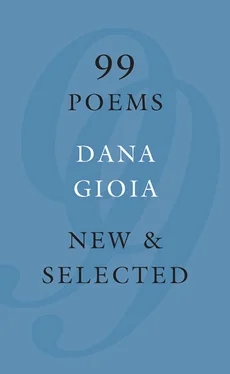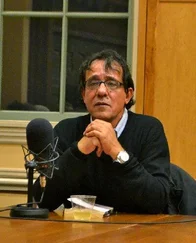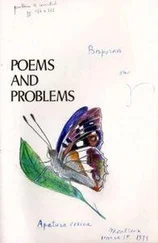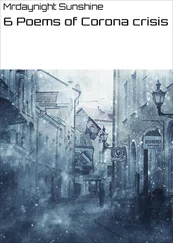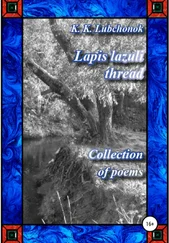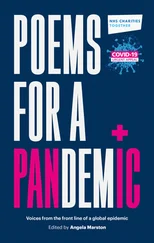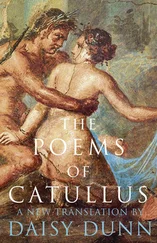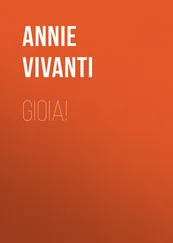Or else could rip away the roof
and stare down at the dirty rooms,
the hallways turning on themselves,
and understand at last their plan—
dark maze without a minotaur,
no monsters but ourselves.
Yet who
could bear to see it all? The slow
descending spirals of the dust
against the spotted windowpane,
the sunlight on the yellow lace,
the hoarded wine turned dark and sour,
the photographs, the letters — all
the crowded closets of the heart.
One wants to turn away — and cry
for fire to break out on the stairs
and raze each suffocating room.
But the walls stay, the roof remains
strong and immovable, and we
can only pray that if these rooms
have memories, they are not ours.
The world does not need words. It articulates itself
in sunlight, leaves, and shadows. The stones on the path
are no less real for lying uncatalogued and uncounted.
The fluent leaves speak only the dialect of pure being.
The kiss is still fully itself though no words were spoken.
And one word transforms it into something less or other—
illicit, chaste, perfunctory, conjugal, covert.
Even calling it a kiss betrays the fluster of hands
glancing the skin or gripping a shoulder, the slow
arching of neck or knee, the silent touching of tongues.
Yet the stones remain less real to those who cannot
name them, or read the mute syllables graven in silica.
To see a red stone is less than seeing it as jasper—
metamorphic quartz, cousin to the flint the Kiowa
carved as arrowheads. To name is to know and remember.
The sunlight needs no praise piercing the rainclouds,
painting the rocks and leaves with light, then dissolving
each lucent droplet back into the clouds that engendered it.
The daylight needs no praise, and so we praise it always—
greater than ourselves and all the airy words we summon.
Just before noon I often hear a voice,
Cool and insistent, whispering in my head.
It is the better man I might have been,
Who chronicles the life I’ve never led.
He cannot understand what grim mistake
Granted me life but left him still unborn.
He views his wayward brother with regret
And hardly bothers to disguise his scorn.
“Who is the person you pretend to be?”
He asks, “The failed saint, the simpering bore,
The pale connoisseur of spent desire,
The half-hearted hermit eyeing the door?
“You cultivate confusion like a rose
In watery lies too weak to be untrue,
And play the minor figures in the pageant,
Extravagant and empty, that is you.”
Whoever you are: step out of doors tonight,
Out of the room that lets you feel secure.
Infinity is open to your sight.
Whoever you are.
With eyes that have forgotten how to see
From viewing things already too well-known,
Lift up into the dark a huge, black tree
And put it in the heavens: tall, alone.
And you have made the world and all you see.
It ripens like the words still in your mouth.
And when at last you comprehend its truth,
Then close your eyes and gently set it free.
(From the German of Rainer Maria Rilke)
Let other mornings honor the miraculous.
Eternity has festivals enough.
This is the feast of our mortality,
The most mundane and human holiday.
On other days we misinterpret time,
Pretending that we live the present moment.
But can this blur, this smudgy in-between,
This tiny fissure where the future drips
Into the past, this flyspeck we call now
Be our true habitat? The present is
The leaky palm of water that we skim
From the swift, silent river slipping by.
The new year always brings us what we want
Simply by bringing us along — to see
A calendar with every day uncrossed,
A field of snow without a single footprint.
THE ANGEL WITH THE BROKEN WING
I am the Angel with the Broken Wing,
The one large statue in this quiet room.
The staff finds me too fierce, and so they shut
Faith’s ardor in this air-conditioned tomb.
The docents praise my elegant design
Above the chatter of the gallery.
Perhaps I am a masterpiece of sorts—
The perfect emblem of futility.
Mendoza carved me for a country church.
(His name’s forgotten now except by me.)
I stood beside a gilded altar where
The hopeless offered God their misery.
I heard their women whispering at my feet—
Prayers for the lost, the dying, and the dead.
Their candles stretched my shadow up the wall,
And I became the hunger that they fed.
I broke my left wing in the Revolution
(Even a saint can savor irony)
When troops were sent to vandalize the chapel.
They hit me once — almost apologetically.
For even the godless feel something in a church,
A twinge of hope, fear? Who knows what it is?
A trembling unaccounted by their laws,
An ancient memory they can’t dismiss.
There are so many things I must tell God!
The howling of the damned can’t reach so high.
But I stand like a dead thing nailed to a perch,
A crippled saint against a painted sky.
Sometimes a child will stare out of a window
for a moment or an hour — deciphering
the future from a dusky summer sky.
Does he imagine that some wisp of cloud
reveals the signature of things to come?
Or that the world’s a book we learn to translate?
And sometimes a girl stands naked by a mirror
imagining beauty in a stranger’s eyes
finding a place where fear leads to desire.
For what is prophecy but the first inkling
of what we ourselves must call into being?
The call need not be large. No voice in thunder.
It’s not so much what’s spoken as what’s heard—
and recognized, of course. The gift is listening
and hearing what is only meant for you.
Life has its mysteries, annunciations,
and some must wear a crown of thorns. I found
my Via Dolorosa in your love.
And sometimes we proceed by prophecy,
or not at all — even if only to know
what destiny requires us to renounce.
O Lord of indirection and ellipses,
ignore our prayers. Deliver us from distraction.
Slow our heartbeat to a cricket’s call.
In the green torpor of the afternoon,
bless us with ennui and quietude.
And grant us only what we fear, so that
Underneath the murmur of the wasp
we hear the dry grass bending in the wind
and the spider’s silken whisper from its web.
He sometimes felt that he had missed his life
By being far too busy looking for it.
Searching the distance, he often turned to find
That he had passed some milestone unaware,
And someone else was walking next to him,
First friends, then lovers, now children and a wife.
They were good company — generous, kind,
But equally bewildered to be there.
He noticed then that no one chose the way—
All seemed to drift by some collective will.
The path grew easier with each passing day,
Since it was worn and mostly sloped downhill.
The road ahead seemed hazy in the gloom.
Читать дальше
